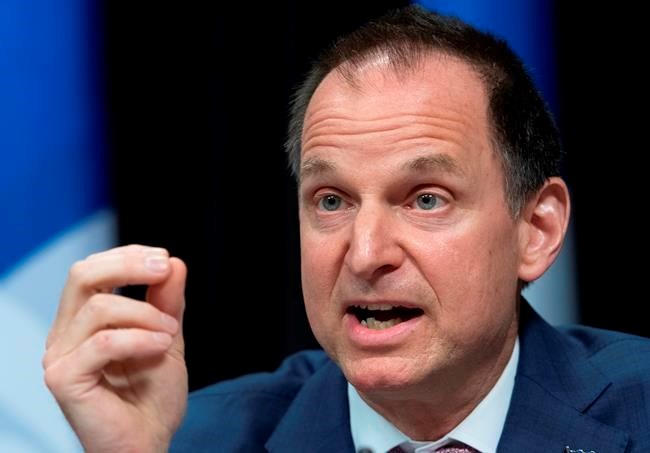QUEBEC — Three months after projecting a surplus of nearly $3 billion, Quebec's finance minister announced Friday that the COVID-19 pandemic will blow through Quebec's financial reserves and leave the province with a $15-billion deficit at the end of the fiscal year.
That figure includes a $4-billion contingency fund that Eric Girard said will help the province survive a second wave of the novel coronavirus. The disease has already killed 5,375 people in Quebec and forced 40 per cent of Quebec's economy to shut down for eight weeks.
Girard expects the province's gross domestic product to shrink this year by 6.5 per cent. Just three months ago, he predicted it would grow by 2 per cent, leading to a budget surplus of nearly $3 billion. Instead, he expects revenues to fall this fiscal year by $8.5 billion.
But despite the immediate gloomy economic forecast, Girard said the recovery has already started, and he expects the province will come out of the COVID-19 crisis with a 6 per cent jump in GDP next year.
"We don't know what's ahead of us in the fall," Girard told reporters in Quebec City, referring to a possible second wave of COVID-19. "But we can already say that June is better than May and May was better than April."
The finance minister also reiterated his government's promise that taxes won't go up — on individuals or on companies — to help return the province to budgetary balance.
"Quebecers are already sufficiently taxed" he said.
Girard's March budget included a $14-billion financing program to stimulate the economy with infrastructure projects. Now, with a $15-billion deficit, the province will be borrowing more than $30 billion this year alone.
However, Girard said Quebec has a "credible plan" to balance the budget in five years and a strong track record of sound fiscal management that he said is appreciated by investors who will be buying the province's debt.
"We have the capacity to face a second wave," he said.
Quebec responded to the pandemic by injecting $3.7 billion in the health sector, as well as $1 billion to help workers and another $2 billion for companies.
The $14.9-billion deficit for fiscal 2020-21 includes the $4-billion contingency fund as well as a $2.6-billion payment to a fund dedicated to paying down the provincial debt, which will stand at just below $200 billion in 2020.
Quebec spent its entire stabilization reserve fund — $14.9 billion — to plug the fiscal hole. The reserve fund was created by law to help the province avoid budget deficits. And now that the reserve is empty, the law requires the fund to be replenished through borrowing, increasing Quebec's debt.
Debt-to-GDP had been decreasing for years and was at 43.4 per cent at the end of March, but has since ballooned and will reach 50.4 per cent in 2021.
Quebec created 77,700 jobs in 2019, and the unemployment rate was 5.1 per cent. In February, Quebec's unemployment rate had fallen further, to 4.5 per cent — a historic low. But by April, the province lost more than 800,000 jobs and unemployment skyrocketed to 17 per cent.
As the province opened up from the pandemic-induced shutdowns, however, about 231,000 jobs returned in May and the unemployment rate fell to 13.7 per cent. Girard said he projects about 162,000 jobs will be created in 2021, and the unemployment rate will drop to 7.6 per cent.
Quebec Liberal Leader Dominique Anglade said the government is being too optimistic in its estimation that the province will rebound in 2021 with GDP growth of 6 per cent.
She added that not enough has been done to support small and medium-sized businesses, particularly in the construction sector and the hard-hit restaurant industry, which has yet to fully reopen across the province.
This report by The Canadian Press was first published June 19, 2020.
Giuseppe Valiante, The Canadian Press



